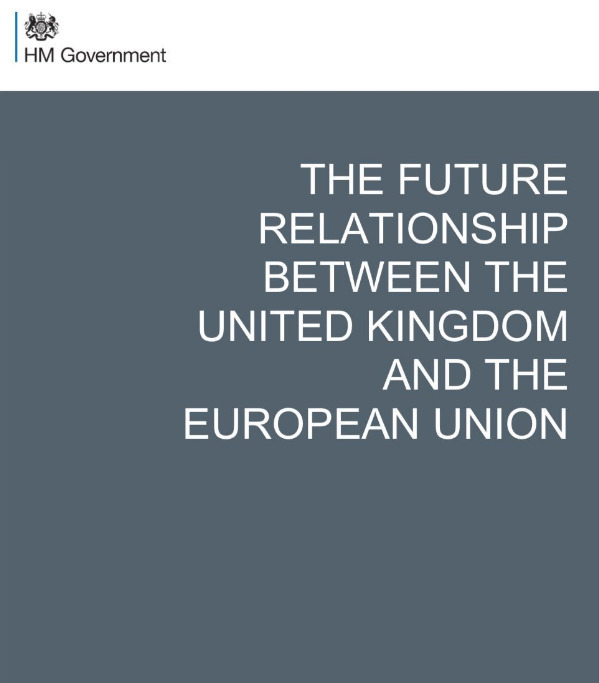July 17 (NBD) -- The long-awaited Brexit White Paper was published last week after two years since the release of Brexit referendum result on June 24 of 2016. The White Paper revealed that the UK government is to seek from the EU for a post-Brexit “association agreement” including a “free-trade area” for goods, a looser arrangement for financial services, alongside a security partnership and continued membership of many EU agencies.

Photo/GOV.UK
People who support hard Brexit hope that the UK should quit the EU thoroughly by leaving the single market and the control of law from the EU. On the other hand, those who support soft Brexit want to keep the current relationship between the UK and the EU while respecting the result of referendum.
Which way UK should choose, hard or soft Brexit, remains in debate. Iain Begg and Thomas Sampson, two Brexit experts from London School of Economics and Political Science shared their insights in an exclusive interview with NBD. Professor Iain Begg once worked as an expert advisor for the House of Commons Treasury Committee.

Iain Begg

Thomas Sampson
NBD: What do you think about the White Paper, the future relationship between the United Kingdom and the EU? Is it soft Brexit or hard Brexit in essence?
Iain Begg: The WP is very much in the direction of soft Brexit, which explains why the more hard-line Brexiteers are so dismayed by it. However, it also has to be seen as still somewhat ambiguous about how close a future economic relationship there will be in future because it emphasizes goods, but leaves services uncertain.When the EU analyses the details, I expect they will be uneasy about some of it.
Thomas Sampson: The White Paper moves the UK towards seeking a softer Brexit. But it is unlikely to be acceptable to the EU and further compromise will probably be required to secure a deal. This means the political bickering in the UK is far from over.
NBD: Both David Davis and Boris Johnson resigned over UK Prime Minister Theresa May's Brexit stance recently. In David’s letter, he wrote, "common rule book" policy hands control of large swathes of our economy to the EU and is certainly not returning control of our laws in any real sense". What do you think of hard Brexit that David Davis support? What is the biggest pros and cons of it? And what is the pros and cons of soft Brexit?
Iain Begg: Hard Brexit effectively delivers what people voted for - a decisive departure from the EU. The core of the case for a soft (or softer) Brexit is to limit the economic costs of the political choice to take back control of laws, justice and so on. The big drawback of a soft Brexit is it will leave the UK still as a rule-taker (obliged to conform to EU rules), yet with the loss of its voice in setting those rules.
Thomas Sampson: Hard Brexit would give the UK full control over economic policy and regulations. The cost is that it would increase trade costs with the EU which would damage the UK's economy. Economic analysis undertaken by the Centre for Economic Performance at LSE suggests a hard Brexit could reduce UK living standards by up to 9%.
NBD: In this white paper, it argues that the Government is proposing the establishment of a free trade area for goods that would protect the uniquely integrated supply chains, "just-in-time" processes (which are built based on a production concept pursuing to eliminate all wastes and continuously improve productivity), the jobs and livelihoods. Could you elaborate the impact of the establishment of such a free trade area on the UK and the EU economy?
Iain Begg: It is ultimately quite simple: the aim is to avoid friction at the UK borders through avoiding nearly all customs checks and controls on product standards. In that way, just in time can still operate on the basis that companies know their supplies will not be subject to unforeseen barriers of the sort that can arise if their are unpredictable customs checks. There is the additional benefit of solving the Irish border conundrum.
Thomas Sampson: The customs arrangement proposed in the White Paper is unlike any existing trade agreement anywhere in the world and is probably not a realistic option. The UK government is right to want to protect cross-border supply chains, but the only way to avoid increased trade barriers is for the UK to remain in a Customs Union with the EU and in the Single Market.
NBD: Two years ago, pound slumped after the announcement of referendum result. Besides the currency, what are other risks that soft and hard Brexit would bring on financial services industry in UK respectively for a short term and a long run?And what are opportunities?
Iain Begg: Never judge on the basis of short-term movements in the exchange rate!! Financial services representatives are unhappy because they risk finding it harder to trade with the EU after Brexit. this could be negative for the City of London, but could also have negative consequences for EU investors who rely on the UK as financial centre. New York and other global centres may be the beneficiaries.
Thomas Sampson: If the UK leaves the Single Market, financial firms in the UK will lose the passporting rights that currently allow them to provide services throughout the EU. This will make the UK a less attractive location for the finance industry and is likely to lead to some jobs leaving the UK.
NBD: Do you think Brexit would have economic influence on emerging markets, especially those in European countries like Turkey? If it would, could you elaborate its economic influence by virtue of a few examples?
Iain Begg: I would not expect much effect on the likes of Turkey or even China.
Thomas Sampson: I would not expect Brexit to have a major impact on countries such as Turkey.
Email: gaohan@nbd.com.cn


 川公网安备 51019002001991号
川公网安备 51019002001991号





